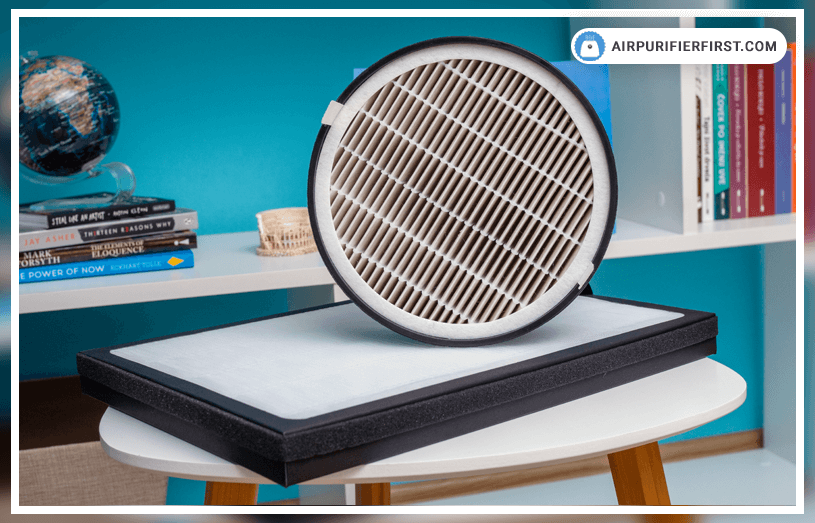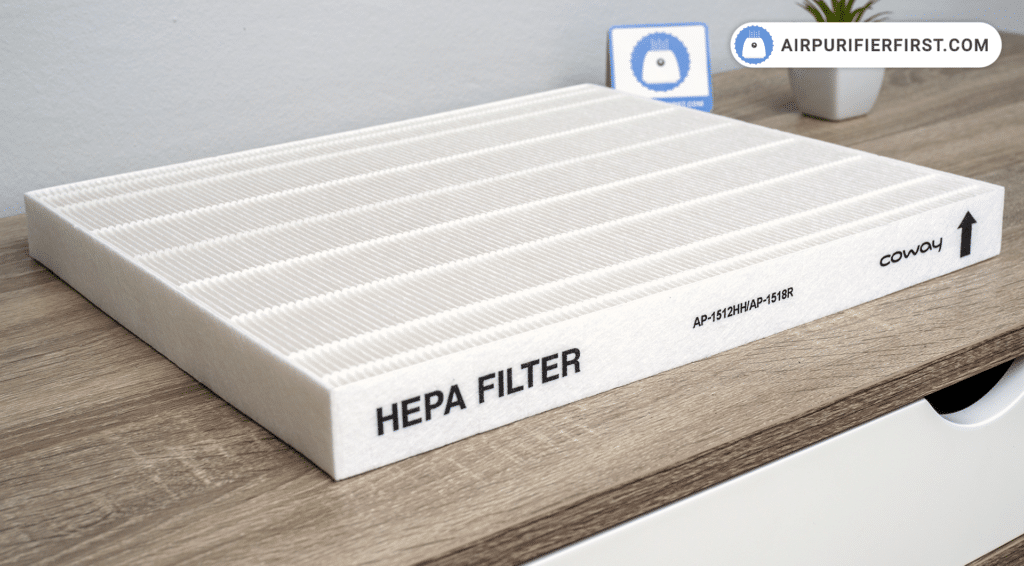True HEPA filters are the most common filtration technology used in commercial air purifiers. They are often referred to as HEPA, but offer much more than the name suggests.

Table of Contents
These filters are specifically designed to remove very small particles from the air, including dust, pollen, pet dander, smoke, and allergens. They have a MERV 17 rating. True HEPA filters capture particles as tiny as 0.3 microns in size, with an astonishing efficiency of 99.97%.
So, if you suffer from allergies related to dust particles, airborne allergens, mold spores, or even tiny airborne particles like smoke (those larger than 0.3 microns), an air purifier equipped with a True HEPA filter is the essential choice—nothing less will suffice.
In this article, I will explain True HEPA’s purpose, compare it to other common filtration technologies, and address any potential questions you might have.
Key Findings on True HEPA Filters!
- True HEPA filters, often called HEPA filters, are incredibly efficient, capturing 99.97% of particles as small as 0.3 microns.
- They are rated MERV 17 (or H13), signifying their exceptional filtration capability.
- True HEPA filters pass strict DOE testing, which is one more confirmation of their effectiveness.
- Proper maintenance and usage optimization can extend the lifespan of True HEPA filters.
- According to our poll, only 76% of the 116 respondents knew the correct efficiency of True HEPA filters.
- Average True HEPA filter lasts about 6-12 months, but there are some that can last up to 5 years.
- When selecting an air purifier, always prioritize those featuring True HEPA filters rather than HEPA-grade, HEPA-Type, or similar ones.
True HEPA Filter Efficiency
As previously mentioned, the True HEPA filter has an efficiency of 99.97% in trapping particles as small as 0.3 microns in size. To earn the label “True HEPA,” a filter must undergo standardized testing to demonstrate its effectiveness. This testing is done by following strict guidelines established by organizations such as the US Department of Energy (DOE).

Let me illustrate what 99.97% efficiency means: out of every 10,000 particles that encounter the filter, only 3% can pass through it. What’s even more impressive is that the average human hair is about 80 microns in diameter, and only particles of 0.3 microns or smaller can penetrate the True HEPA filter; all others remain trapped.
The Importance of MERV Rating
In the realm of air purifiers, the MERV scale is the most important and reliable rating. MERV stands for Minimum Efficiency Reporting Value, indicating a filter’s ability to capture particles ranging from 0.3 to 10 microns (µm) in size. This method for evaluating filter efficiency was established by ASHRAE.
In a nutshell, the higher the MERV rating, the more efficient the filter is. Since True HEPA filters have a MERV 17 rating, I strongly recommend considering only air purifiers equipped with a True HEPA filter, nothing less than that. The table below provides a breakdown of what each MERV number represents.
| MERV Rating | Average Particle Size Efficiency in Microns |
|---|---|
| 1-4 | 3.0 – 10.0 less than 20% |
| 5 | 3.0-10.0 greater than or equal to 20% |
| 6 | 3.0-10.0 greater than or equal to 35% |
| 7 | 3.0-10.0 greater than or equal to 50% |
| 8 | 1.0-3.0 greater than or equal to 20% 3.0-10.0 greater than or equal to 70% |
| 9 | 1.0-3.0 greater than or equal to 35% 3.0-10.0 greater than or equal to 75% |
| 10 | 1.0-3.0 greater than or equal to 50% 3.0-10.0 greater than or equal to 80% |
| 11 | 0.30-1.0 greater than or equal to 20% 1.0-3.0 greater than or equal to 65% 3.0-10.0 greater than or equal to 85% |
| 12 | 0.30-1.0 greater than or equal to 35% 1.0-3.0 greater than or equal to 80% 3.0-10.0 greater than or equal to 90% |
| 13 | 0.30-1.0 greater than or equal to 50% 1.0-3.0 greater than or equal to 85% 3.0-10.0 greater than or equal to 90% |
| 14 | 0.30-1.0 greater than or equal to 75% 1.0-3.0 greater than or equal to 90% 3.0-10.0 greater than or equal to 95% |
| 15 | 0.30-1.0 greater than or equal to 85% 1.0-3.0 greater than or equal to 90% 3.0-10.0 greater than or equal to 95% |
| 16 | 0.30-1.0 greater than or equal to 95% 1.0-3.0 greater than or equal to 95% 3.0-10.0 greater than or equal to 95% |
| 17 (High-efficiency Particulate Air filter HEPA) | 99.97% of particles in the 0.3-micron range Particles that are larger or smaller than 0.3 microns are captured with a greater than 99.97% efficiency |
On a personal note, I have performed tests on air purifiers having True HEPA, HEPA, HEPA-Type, and almost all available filtration technologies. There is clear evidence of the superior efficiency of True HEPA filters.
For instance, the Hamilton Beach TrueAir uses a HEPA-grade filter, which captures 99% of airborne particles down to 0.3 microns in size—a considerably lower efficiency than that of True HEPA filters. This results in a less impressive performance. In my tests, it improved air quality in a 194 sq. ft. room by approximately 82%.
Conversely, the Levoit Core 300S, an air purifier equipped with a True HEPA filter, made much better results in the performance test, improving the air quality in almost identical conditions by about 94%. I believe the performance difference here is clear!
Are People Familiar with the True HEPA Filter Term?
Through the media I’m using to communicate with Air Purifier First visitors, I created a poll where I asked people if they were familiar with the efficiency of a True HEPA filter. There were two options to choose from:
- It removes 99.97% of airborne particles as small as 0.3 microns in size.
- It removes 99.99% of airborne particles as small as 0.3 microns in size.
For a more visually appealing experience, below is the chart with research results.
Out of 116 people who answered the question, only 76% (88 people) gave the correct answer, while 24% (28 people) gave the wrong answer. This proves that many people are unfamiliar with essential terms regarding air purifiers.
You can see the poll on our YouTube channel.
FAQ about True HEPA filters
What is the difference between True HEPA and HEPA?
True HEPA requires certification, is more efficient, and, naturally, more expensive. It captures 99.97% of airborne particles as small as 0.3 microns in size, while the efficiency of standard HEPA filters may vary depending on their MERV rating.
What is a True HEPA Filter Made of?
A True HEPA filter is made from plastic fibers (polypropylene), fiberglass, or borosilicate glass fibers, bonded together with an acrylic binder to restrict the particles that can pass through.
What is the MERV 17 rating of a True HEPA filter?
A True HEPA filter has a MERV rating of 17 or higher, indicating its ability to trap 99.97% of airborne particles that are 0.3 microns in size or larger.
Is True HEPA a marketing term?
While some bloggers, independent researchers, and review sites claim that this is a marketing term, the fact that this type of filter successfully passes the United States Department of Energy (DOE) tests makes it ungrateful to say that True HEPA is just a marketing term.
Does the True HEPA require replacement?
True HEPA filters aren’t permanent; they have a predefined lifespan, typically ranging from 6-12 months, but in some cases, they can last up to 5 years. Most air purifiers have a filter reset indicator built in to notify you when it’s time for filter replacement.
Can I prolong the life of a True HEPA filter?
True HEPA filters are often the primary filtration layer in air purifiers. You can prolong their life through proper maintenance (cleaning the pre-filter), optimizing the usage of the air purifier, and not using the device when you aren’t at home.
Final Conclusion
To summarize, the True HEPA filter is a high-efficiency filter with a MERV 17 rating (or H13 rating), effectively capturing 99.97% of particles as small as 0.3 microns in size.
True HEPA filters are typically the most efficient filter type you can find in commercial air purifiers, making them a top priority and a must-have when choosing an air purifier.
To earn the True HEPA label, an air purifier must undergo rigorous testing and evaluation according to DOE standards and testing requirements.
If you have any questions about True HEPA filters, please don’t hesitate to ask in the comment box below.
Leave a Reply